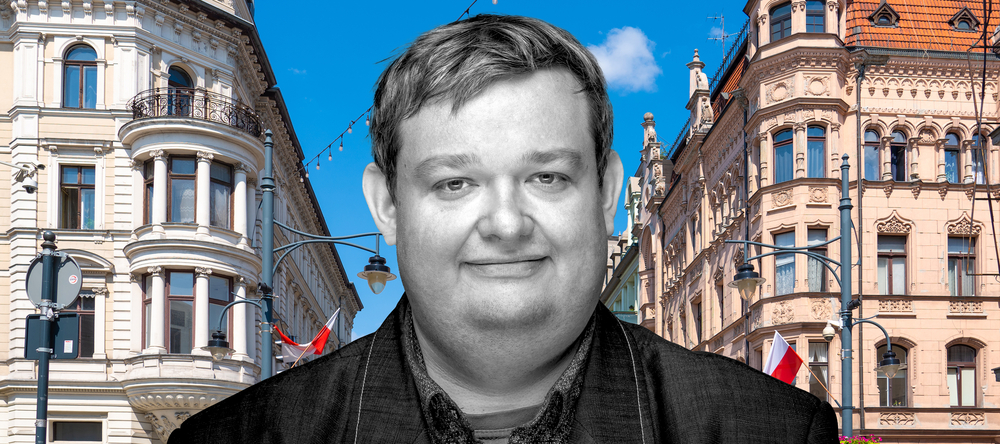
Dr Kamil Śmiechowski is a historian strongly associated with Lodz. He deals with Poland in the 19th and 20th centuries, especially the history of cities and their modernisation. What he likes most about history is what is about to happen. Thanks to studying the past, he better understands why the present is not working the way we would like. He is a co-founder and a secretary of the University of Lodz Interdisciplinary Centre for Urban Studies.
What inspired you to become a scientist?
First of all, it was curiosity about the world. It was not enough for me to absorb the knowledge that I obtained during my studies. I joined the activities of a student science club, wrote the first papers and took part in the first conferences already during my studies. Then I started doctoral studies and ... somehow everything went on smoothly.
What impact does your work have on the surrounding reality?
I believe that the 21st century will be a time when cities become a natural environment for man. I would like the university to speak out loud on the most important issues related to cities and their development. Lodz – a city unlike any other, which was the avant-garde of modernity in our part of Europe – will have a lot to say in this new reality. Unfortunately, it is fashionable to disregard scientific findings and question what experts say, so I am not very optimistic about the impact of my research on the surrounding reality.
How do you understand the term: profession of a scientist?
As scientists, we must be aware of the limitations in which we operate, and at the same time do our things and strive to describe reality in the most reliable way. As historians, we have a unique mission to protect knowledge about the past, which is a multi-threaded matter.
More information about Dr Kamil Śiechowski’s work
A co-founder and a secretary of the University of Lodz Interdisciplinary Center for Urban Studies
Łódź. Miasto rewitalizacji. [Lodz. City of revitalisation] (in Polish)
Reymont miał talent do obserwacji reporterskich. [Reymont had talent for journalistic observations] (in Polish)
Największe problemy Warszawy na początku XX wieku. Na co skarżyli się mieszkańcy i eksperci? [The biggest problems of Warsaw at the beginning of the 20th century. What did residents and experts complain about?] (in Polish)
Bolączki i absurdy życia w zaborze rosyjskim. Na co najbardziej narzekali nasi przodkowie? [Nuisances and absurdities of life in the Russian partition. What did our ancestors complain about most?] (in Polish)
Major publications
- Kwestie miejskie. Dyskusja o problemach i przyszłości miast w Królestwie Polskim 1905–1915 [Urban issues. Discussion on the problems and future of cities in the Kingdom of Poland 1905–1915] (in Polish)
- Przeszłość, teraźniejszość i przyszłość Łodzi. Tom 1. [The past, present and future of Lodz. Volume 1.] (in Polish)
The history and identity of an industrial city. A collection of studies on the occasion of 200 years of industrial Lodz - Przeszłość, teraźniejszość i przyszłość Łodzi Tom 2. [The Past, Present and Future of Lodz. Volume 2.] (in Polish)
Industrial city space. A collection of studies on the occasion of 200 years of industrial Lodz - Łódzka wizja postępu [Lodz vision of progres] (in Polish)
- Z perspektywy stolicy. Obraz Łodzi w warszawskich tygodnikach społeczno-kulturalnych (1881-1905) [From the perspective of the capital. The image of Lodz in Warsaw socio-cultural weeklies (1881-1905)] (in Polish)
- From Cotton and Smoke: Łódź – Industrial City and Discourses of Asynchronous Modernity 1897–1994
- Robotnicy Łodzi drugiej połowy XIX wieku. Nowe kierunki badawcze [Lodz workers in the second half of the 19th century. New research directions] (in Polish)
Scientific achievements
Source: Dr Kamil Śmiechowski (Department of Polish History of 19th Century, University of Lodz)
Edit: Michał Gruda (Communications and PR Centre, University of Lodz)
The mission of the University of Lodz is to conduct reliable research and actively disseminate facts and research results so as to wisely educate future generations, be useful to society and courageously respond to the challenges of the modern world. Scientific excellence is always our best compass. Our values include: courage, curiosity, commitment, cooperation and respect.
